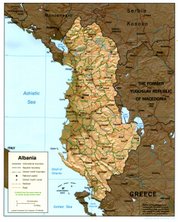In the last couple of days a few references appear online about Albania being picked by Lonely Planet as one of the Top 10 places for tourism in 2011.
This country is already doing a booming business in this field with a vast numbers of hostels, motels, hotels, and apartments, accomodating more than 300.000 visitors a year in the south alone. In addition to many young people, armed with backpacks, who like to explore the unknown, rugged, inland mountainous areas, a large influx of summer tourists come from the Albanian populations living outside Albania's borders. They don't have access to sea coasts of their own and now can enjoy Albania's long shore extending from the Adriatic to the Ionic-Mediterranean waters. (BTW, this week temperature in Tirana is still in the low 70's F during midday)
Building of necessary infrastructures needed to support this industry, such as new roads and modern servicing conveniences even in the most remote, and once inaccesible areas, are also intensified by both the governmental and private sectors.
Today another piece of news is also the re-opening of underground caves in the Dajti mountain chain bordering the capital city of Tirana, which were built by the ex dictatorship as an hideout in case of a political crisis.
The outcome of this precaution is now described as another folly of that isolationist regime when thousands of bunkers were also constructed around the entire Albanian territory to safeguard the country against foreign invasions. As some of these mushroom-shaped, reinforced cement structures are now being used mainly as tourist attractions, and in some cases, also converted as guests accomodations, today's article questions the possibile future use of these newly accessible hidden mountain places.
One thing that comes immediately to my mind is that of the "Iron Mountain" type of concept, very useful and fully functional in the United States.
As known, in Utah the Mormon Church has preserved, in environmentally setup caves, archival and historic records of generations of Americans that can trace their ancestries electronically from them. In other states businesses such as "Iron Mountain" provide storage-as-a-service facility for data recuperation, maintenance, and archiving for thousands and all sorts for companies, financial, and governmental institutions that have established very specific plans for disaster recovery from all sorts of destructive events, including natural calamities.
Let's hope that Albania makes a good use of these natural resources, among the many others that it is endowed with, and not only for tourism, but for more peaceful preservation of its history and its modern development.
Thursday, November 04, 2010
Subscribe to:
Post Comments (Atom)





No comments:
Post a Comment